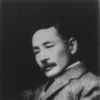Yoshida Kenkō (1282–1350)
Author of Essays in Idleness The Tsurezuregusa of Kenkō
About the Author
Image credit: wikimedia commons - Portrait by Kikuchi Yosai(菊池容斎)
Works by Yoshida Kenkō
古今集古注 1 copy
Associated Works
The Moral Life: An Introductory Reader in Ethics and Literature (1999) — Contributor — 189 copies, 2 reviews
Lapham's Quarterly - Lines of Work: Volume IV, Number 2, Spring 2011 (2011) — Contributor — 30 copies, 2 reviews
Tagged
Common Knowledge
- Canonical name
- Yoshida Kenkō
- Legal name
- 兼好
- Other names
- Kenkō
Urabe Kenkō - Birthdate
- c. 1283
- Date of death
- c. 1350-2
- Gender
- male
- Nationality
- Japan
- Country (for map)
- Japan
- Places of residence
- Kyoto, Japan
- Short biography
- Moine bouddhiste. - Poète et homme de lettres. - Officier subalterne à la Cour. - Nom d'état civil : Urabe Kaneyoshi.
Members
Reviews
Lists
Awards
You May Also Like
Associated Authors
Statistics
- Works
- 10
- Also by
- 3
- Members
- 1,090
- Popularity
- #23,567
- Rating
- 4.0
- Reviews
- 19
- ISBNs
- 46
- Languages
- 11
- Favorited
- 1
















